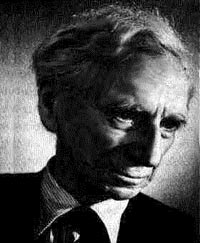Monroe C. Beardsley and Elizabeth Lane Beardsley
Bertrand Russell
Biography
Bertrand Arthur William Russell, 3rd Earl Russell, 18 May 1872 – 2 February 1970) was a British philosopher, logician, mathematician, historian, writer, social critic, political activist and Nobel laureate. At various points in his life he considered himself a liberal, a socialist, and a pacifist, but he also admitted that he had "never been any of these things, in any profound sense". He was born in Monmouthshire into one of the most prominent aristocratic families in the United Kingdom.
In the early 20th century, Russell led the British "revolt against idealism". He is considered one of the founders of analytic philosophy along with his predecessor Gottlob Frege, colleague G. E. Moore, and protégé Ludwig Wittgenstein. He is widely held to be one of the 20th century's premier logicians. With A. N. Whitehead he wrote Principia Mathematica, an attempt to create a logical basis for mathematics. His philosophical essay "On Denoting" has been considered a "paradigm of philosophy". His work has had a considerable influence on mathematics, logic, set theory, linguistics, artificial intelligence, cognitive science, computer science (see type theory and type system), and philosophy, especially the philosophy of language, epistemology, and metaphysics.
Russell was a prominent anti-war activist; he championed anti-imperialism. Occasionally, he advocated preventive nuclear war, before the opportunity provided by the atomic monopoly had passed, and "welcomed with enthusiasm" world government. He went to prison for his pacifism during World War I. Later, he concluded war against Adolf Hitler was a necessary "lesser of two evils". He criticized Stalinist totalitarianism, attacked the involvement of the United States in the Vietnam War, and was an outspoken proponent of nuclear disarmament. In 1950 Russell was awarded the Nobel Prize in Literature "in recognition of his varied and significant writings in which he champions humanitarian ideals and freedom of thought".
Russell's Paradox

Russell's paradox represents either of two interrelated logical antinomies. The most commonly discussed form is a contradiction arising in the logic of sets or classes. Some classes (or sets) seem to be members of themselves, while some do not. The class of all classes is itself a class, and so it seems to be in itself. The null or empty class, however, must not be a member of itself. However, suppose that we can form a class of all classes (or sets) that, like the null class, are not included in themselves. The paradox arises from asking the question of whether this class is in itself. It is if and only if it is not. The other form is a contradiction involving properties. Some properties seem to apply to themselves, while others do not. The property of being a property is itself a property, while the property of being a cat is not itself a cat. Consider the property that something has just in case it is a property (like that of being a cat) that does not apply to itself. Does this property apply to itself? Once again, from either assumption, the opposite follows. The paradox was named after Bertrand Russell (1872-1970), who discovered it in 1901.
Mathematics - Russell's Paradox, 3:02
In the foundations of mathematics, Russell's paradox (also known as Russell's antinomy), discovered by Bertrand Russell in 1901, showed that some attempted formalizations of the naive set theory created by Georg Cantor led to a contradiction. The same paradox had been discovered a year before by Ernst Zermelo but he did not publish the idea, which remained known only to David Hilbert, Edmund Husserl, and other members of the University of Göttingen.
According to naive set theory, any definable collection is a set. Let R be the set of all sets that are not members of themselves. If R is not a member of itself, then its definition dictates that it must contain itself, and if it contains itself, then it contradicts its own definition as the set of all sets that are not members of themselves. This contradiction is Russell's paradox. Symbolically:
https://youtu.be/GpVRePLMLbU
Defence of Socrates
The Apology of Socrates (Greek: Ἀπολογία Σωκράτους, Apologia Sokratous, Latin: Apologia Socratis), by Plato, is the Socratic dialogue that presents the speech of legal self-defence, which Socrates presented at his trial for impiety and corruption, in 399 BC.
Specifically, the Apology of Socrates is a defence against the charges of “corrupting the young” and “not believing in the gods in whom the city believes, but in other daimonia that are novel” to Athens (24b).
Among the primary sources about the trial and death of the philosopher Socrates (469–399 BC), the Apology of Socrates is the dialogue that depicts the trial, and is one of four Socratic dialogues, along with Euthyphro, Phaedo, and Crito, through which Plato details the final days of the philosopher Socrates.
Socrates' Apology in 2 minutes, 2:07
https://youtu.be/okZHInakSYo
Plato
https://youtu.be/i5JVqp-qlic







